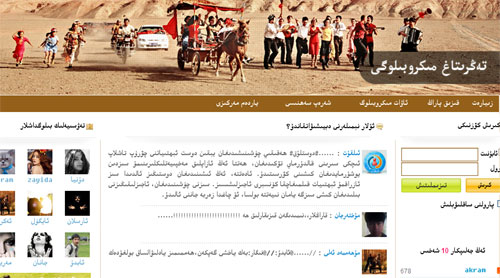Xinjiang launches Uygur language microblogging service
 0 Comment(s)
0 Comment(s) Print
Print E-mail Xinhua, March 2, 2012
E-mail Xinhua, March 2, 2012

Authorities of northwest China's Xinjiang Uygur Autonomous Region have launched a microblogging service in the Uygur language, the mother tongue of more than 9.65 million inhabitants of the region, the government announced Thursday.
The microblogging service in trial operation (www.barmu.cn) is operated by Tianshannet.com, the regional government's official website. Barmu in the Uygur word for "Are you there?"
Eliti Sali, a deputy head of the Xinjiang government's information office, said the service is the first online platform for the Uygur-speaking people to communicate with the government in their language.
"Uygurs-speaking people in and out of China are very concerned about Xinjiang. The government now can reach to them through microblogs -- telling them what the government thinks and collecting their suggestions on the social and economic development of Xinjiang," the official said.
"We will adopt an open attitude. The microblogging service will enable people to supervise the government administration," he added.
The Uygur language, based on the Arabic alphabet, is part of the Tujue (Turks) branch of the Altaic language family. In Xinjiang, ethnic residents lack basic Mandarin language skills due to inadequate education while many Han officials from inland provinces lack Uygur language skills.
A regional association survey estimates that 40 percent of Xinjiang's 20 million population surfed the Internet. Among them ethnic minorities, mostly Uygurs, account for 44 percent.
"I am so thrilled! I was once told it could only be a dream to tweet in Uygur but it is real now," said a microblogger Elhut in his microblog post. "I have started blogging about keeping fit. I hope you guys can follow."
"It feels so good to read microblogs in Uygur. We Uygurs are not behind the times," said another microblogger Mahmut. "The government did a good thing. The distance between the government and the public has been closed."
The microblogging service requires real name registration, officials said. There is no immediate estimate on the number of people registered to open an account, but officials including Mutarifu Kasimu, a deputy head of the regional legislature, are among the users.
Most popular microbloggers are Uygur pop singer Elken, followed by Xinjiang's Halal food tycoon Radil Abula.
The Xinjiang regional government on Thursday also launched its official microblog "Xinjiang Announce" at t.qq.com, Tencent's popular microblogging site.
The office's account "Xinjiang Announce" on Sina Weibo in Mandarin Chinese has attracted more than 370,000 followers since it was launched on Dec. 27, 2011. More than a thousand microblogs have been posted.
"It is a new thing for us to communicate with people through new media. The regional government will spare no efforts to develop the digital application of ethnic languages," said Hou Hanmin, head of Xinjiang Information Office.
Across the country, government departments and state agencies have become increasingly active over the past year in interacting with fast growing number of microbloggers in the country -- which has exceeded 300 million.
The rapid growth of government microblogs in China, the world's largest online population of 500 million, is changing the method for dialog and the whole dynamic of the relationship between the government and the public.
According to a research report published late last year, the number of accounts verified as being managed by government officials or departments on Sina Weibo, China's major microblog service, had surged to nearly 20,000.
The Beijing Municipal Public Security Bureau, the China International Search and Rescue Team and the Ministry of Foreign Affairs have become the top three influential government microbloggers in terms of both followers and other microblogging factors, according to the report, compiled by a research team for public-opinion monitoring website people.com.cn.
But the report also noted that more microblogs were registered in the country's economically developed regions, while few were in relatively poor western regions.
There were also a few complaints about Barmu's service.
"It seems that the microblogging service is not always stable. When I type, the words sometimes cannot immediately appear on the screen," said Abulajan Turd on a post.
Hou, the official, said Barmu is still on trial and authorities will soon improve the service based on users' feedback and boost the technology support team to maintain Barmu's daily operations.






Go to Forum >>0 Comment(s)